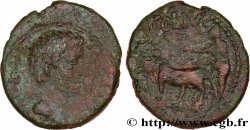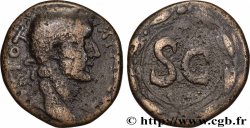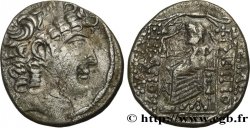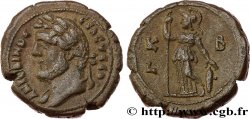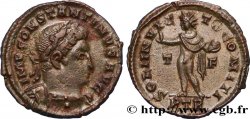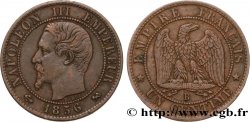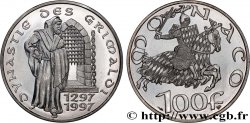bpv_295681 - AUGUSTUS Tétradrachme syro-phénicien
Not available.
Item sold on our e-shop (2017)
Price : 290.00 €
Item sold on our e-shop (2017)
Price : 290.00 €
Type : Tétradrachme syro-phénicien
Date: 30-29 AC.
Mint name / Town : Antioche, Syrie, Séleucie et Piérie
Metal : silver
Diameter : 26 mm
Orientation dies : 12 h.
Weight : 14,24 g.
Rarity : R1
Catalogue references :
Predigree :
Cet exemplaire est le 0014_005 de la base TSP, il provient de la trouvaille de Livia et de la collection de Richard McAlee. C’est cet exemplaire qui illustre le type dans l’ouvrage de Richard McAlee The coins of Roman Antioch, page 69, n°13
Obverse
Obverse legend : ANÉPIGRAPHE.
Obverse description : Tête diadémée de Philippe Philadelphe à droite, entouré de la stemma (O’).
Reverse
Reverse description : Zeus assis à gauche sur un trône avec dossier, tenant de la main droite une Niké qui le couronne et un sceptre long de la main gauche ; au-dessus de Zeus, le foudre ; monogramme dans le champ à gauche ; date à l’exergue.
Reverse legend : BASILEWS/ FILIPPOU/ EPIFANOUS/ FILADELFOU, K(Basilews Filippou Epifanous Filadelfou)
Reverse translation : (Roi Philippe Epiphane Philadelphe/ monogramme d’Antioche et millésime 20).
Commentary
An 20 de l’ère césarienne, deuxième année de frappe sous Auguste de la série intermédiaire entre les frappes séleucides et les frappes impériales syriennes.
La colonisation romaine se conforte et la Syrie devient une province impériale gérée par un Legatus Augusti. La monnaie, bien que contrôlée par Rome, reste toujours au type séleucide et seul le petit monogramme marque le changement.
Les émissions au type immobilisé de Philippe Philadelphe sont très importantes car elles illustrent parfaitement la logique impériale de la colonisation romaine. Autant une conquête de revendication territoriale d'expansion de l'espace vital autour d'un pouvoir central de type national va chercher à éliminer toutes les symboliques locales dans les pays conquis pour imposer celles du conquérant (selon le principe de un peuple, un roi, une foi, une loi), autant un empire va laisser cohabiter des symboliques différentes. C'est ce qui se passe en Syrie, Palestine et Phénicie dans les premiers temps de l'expansion. Loin d'imposer le denier ou la typologie romaine, les Latins vont respecter la métrologie et même le type. Il faudra attendre les rares émissions d'Auguste au revers du Zeus, presque cinquante ans, pour voir apparaître le portrait du Prince sur les monnaies locales en argent.
Style classique pour l’émission avec les mèches traitées en “serpents”. On remarquera le style du plissé de l’himation de Zeus que nous retrouverons exactement dans la première émission au portrait d’Auguste.
Dans la base TSP maintenue par Michel Prieur, vingt et un exemplaires sont maintenant répertoriés mais il faut noter que sur ce total, onze sont en musées ou collections publiques.
Year 20 of the Caesarian era, second year of minting under Augustus in the intermediate series between the Seleucid minting and the Syrian imperial minting.
Roman colonization was consolidated and Syria became an imperial province managed by a Legatus Augusti. The coin, although controlled by Rome, still remains of the Seleucid type and only the small monogram marks the change.
The immobilized type emissions of Philippe Philadelphe are very important because they perfectly illustrate the imperial logic of Roman colonization.. Just as a conquest of territorial claim of expansion of the living space around a central power of national type will seek to eliminate all local symbols in the conquered countries to impose those of the conqueror (according to the principle of one people, one king, one faith, one law), so an empire will allow different symbols to coexist. This is what happened in Syria, Palestine and Phoenicia in the early days of expansion.. Far from imposing the denarius or Roman typology, the Latins will respect metrology and even the type. It was not until the rare issues of Augustus on the reverse of the Zeus, almost fifty years later, that the portrait of the Prince appeared on local silver coins..
Classic style for the show with the strands treated in “snakes”. We will notice the style of the pleating of the himation of Zeus that we will find exactly in the first emission with the portrait of Augustus.
In the TSP database maintained by Michel Prieur, twenty-one examples are now listed, but it should be noted that of this total, eleven are in museums or public collections.
La colonisation romaine se conforte et la Syrie devient une province impériale gérée par un Legatus Augusti. La monnaie, bien que contrôlée par Rome, reste toujours au type séleucide et seul le petit monogramme marque le changement.
Les émissions au type immobilisé de Philippe Philadelphe sont très importantes car elles illustrent parfaitement la logique impériale de la colonisation romaine. Autant une conquête de revendication territoriale d'expansion de l'espace vital autour d'un pouvoir central de type national va chercher à éliminer toutes les symboliques locales dans les pays conquis pour imposer celles du conquérant (selon le principe de un peuple, un roi, une foi, une loi), autant un empire va laisser cohabiter des symboliques différentes. C'est ce qui se passe en Syrie, Palestine et Phénicie dans les premiers temps de l'expansion. Loin d'imposer le denier ou la typologie romaine, les Latins vont respecter la métrologie et même le type. Il faudra attendre les rares émissions d'Auguste au revers du Zeus, presque cinquante ans, pour voir apparaître le portrait du Prince sur les monnaies locales en argent.
Style classique pour l’émission avec les mèches traitées en “serpents”. On remarquera le style du plissé de l’himation de Zeus que nous retrouverons exactement dans la première émission au portrait d’Auguste.
Dans la base TSP maintenue par Michel Prieur, vingt et un exemplaires sont maintenant répertoriés mais il faut noter que sur ce total, onze sont en musées ou collections publiques.
Year 20 of the Caesarian era, second year of minting under Augustus in the intermediate series between the Seleucid minting and the Syrian imperial minting.
Roman colonization was consolidated and Syria became an imperial province managed by a Legatus Augusti. The coin, although controlled by Rome, still remains of the Seleucid type and only the small monogram marks the change.
The immobilized type emissions of Philippe Philadelphe are very important because they perfectly illustrate the imperial logic of Roman colonization.. Just as a conquest of territorial claim of expansion of the living space around a central power of national type will seek to eliminate all local symbols in the conquered countries to impose those of the conqueror (according to the principle of one people, one king, one faith, one law), so an empire will allow different symbols to coexist. This is what happened in Syria, Palestine and Phoenicia in the early days of expansion.. Far from imposing the denarius or Roman typology, the Latins will respect metrology and even the type. It was not until the rare issues of Augustus on the reverse of the Zeus, almost fifty years later, that the portrait of the Prince appeared on local silver coins..
Classic style for the show with the strands treated in “snakes”. We will notice the style of the pleating of the himation of Zeus that we will find exactly in the first emission with the portrait of Augustus.
In the TSP database maintained by Michel Prieur, twenty-one examples are now listed, but it should be noted that of this total, eleven are in museums or public collections.







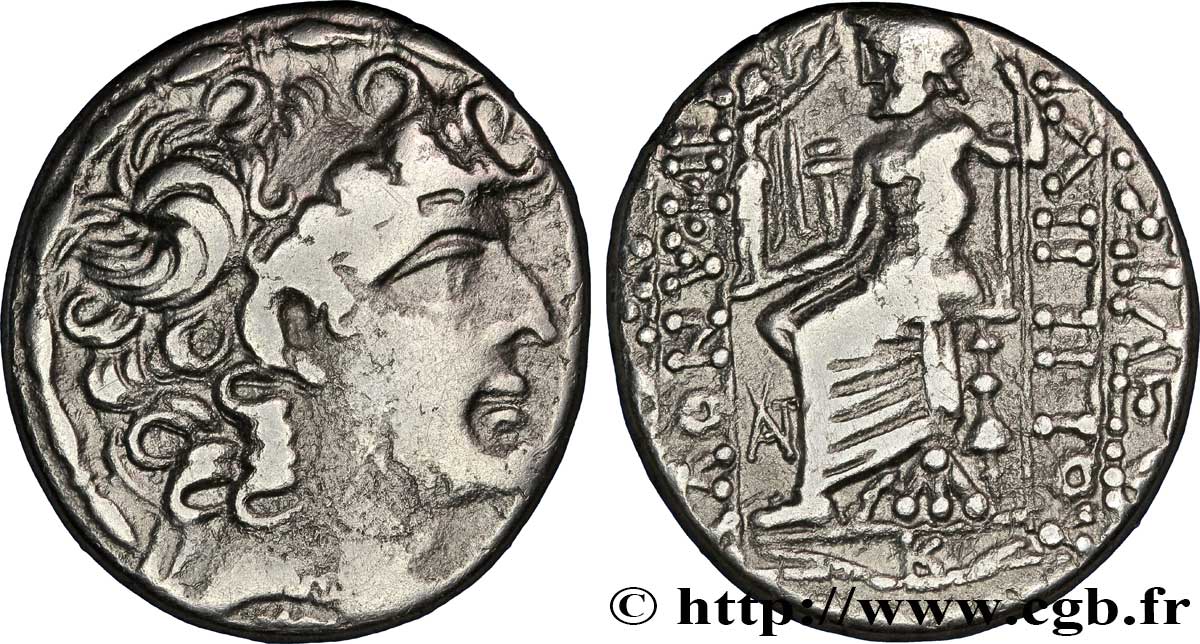
 Report a mistake
Report a mistake Print the page
Print the page Share my selection
Share my selection Ask a question
Ask a question Consign / sell
Consign / sell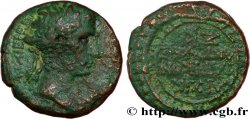
 Full data
Full data